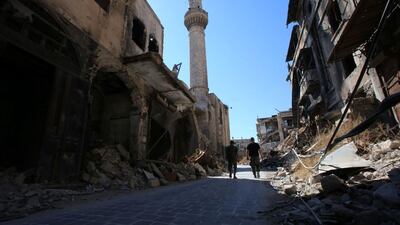MOSCOW // Russia stepped up the war of words with America over Syria on Saturday as the actual war on the ground escalated with more violations of the fragile ceasefire.
“The situation in Syria is worsening,” said Russian General Vladimir Savchenko in a televised briefing. “In the past 24 hours, the number of attacks have risen sharply.” There had been 55 attacks on government positions and civilians, with 12 killed, including two children and a volunteer with the Syrian Red Crescent, said the general.
And he made it clear who he thought was to blame. “If the American side does not take the necessary measures to carry out its obligations ... a breakdown of the ceasefire will be on the United States.”
It was an unequivocal condemnation by the Russians of their supposed partners in the ceasefire brokered by US secretary of state John Kerry and Russian foreign minister Sergey Lavrov. Russian president Vladimir Putin — a key ally of Syrian president Bashar Al Assad — also weighed in, accusing Syrian rebel fighters — allies of the US — of exploiting the truce to regroup.
“We see attempts to regroup among these terrorists, to switch one label for another, one name for another and keep their military capacity,” he said during a trip to Kyrgyzstan. “ The US apparently has the desire to keep the capabilities to fight the lawful government of President Assad,” he added, calling it a “very dangerous path.”
Syria’s foreign ministry meanwhile insisted the government had done all that was necessary to facilitate the delivery of aid.
Though the general impression given was that the ceasfire was holding, fresh shelling and clashes were reported overnight in some areas of the country. More seriously, Syria’s army general command said warplanes from the US-led coalition fighting against ISIL bombed a Syrian army position at Jebel Tharda near Deir al-Zor airport at 5 p.m. (1400 GMT) on Saturday, according to state media.
The air strike killed Syrian soldiers who had been preparing for an attack against ISIL and was “conclusive evidence” that the US and its allies support the jihadist group, the Syrian army said in a statement.
The Syrian government also accused rebels of firing on routes into the northern city of Aleppo but five days in, the ceasefire appeared to be largely holding. Despite this, not a single gram of aid has reached any of the areas under siege.
In New York, the UN Security Council cancelled an urgent meeting that had been called to discuss whether to endorse the ceasefire, billed as the “last chance” to end the five-year war that has killed 300,000 people.
The closed-door consultations were scrapped because Moscow and Washington could not agree on what to say.
Moscow said it was ready to prolong the truce by 72 hours, but there has been no formal announcement of an extension.
The implementation of the ceasefire has been complicated by extremists — who are not covered by the ceasefire — and mainstream rebels sometimes being present on the same front lines. The challenge for Washington is to persuade the opposition groups it backs to separate themselves from the former Al-Qaeda affiliate Jabhat Fatah Al-Sham, which recently changed its name from Al-Nusra Front.
But the initial main purpose of the truce was to allow much-needed humanitarian supplies to enter areas such as Aleppo, where 250,000 people are living under government siege. Castello Road, the main thoroughfare between the Turkish border, where the aid lorries are waiting, to Aleppo was to be demilitarised and made safe for the 40 lorries waiting to cross into Syria from Turkey. But each side accuses the other of not clearing out its ordnance and roadblocks away from the route and Saturday passed with no guarantee of safety to reassure the UN..
“Still no progress, but the UN is ready to move once we get the go ahead,” said David Swanson, a spokesman for the UN Office for the Coordination of Humanitarian Affairs.
Under the US-Russia agreement, if the ceasefire holds for a week, Moscow and Washington would begin coordinated joint attacks on areas held by ISIL. Since the trucecame into effect, 47 civilians have been killed in those areas, the vast majority in unidentified air strikes.
In a telephone call on Saturday, Mr Lavrov told his American opposite number that Russia has coordinated the aid delivery with Syrian government forces and called on Washington to exercise similar influence with Syrian rebels, reminding Mr Kerry of Washington’s obligation “to separate units of the moderate opposition from terrorist groupings.” .
*agencies

